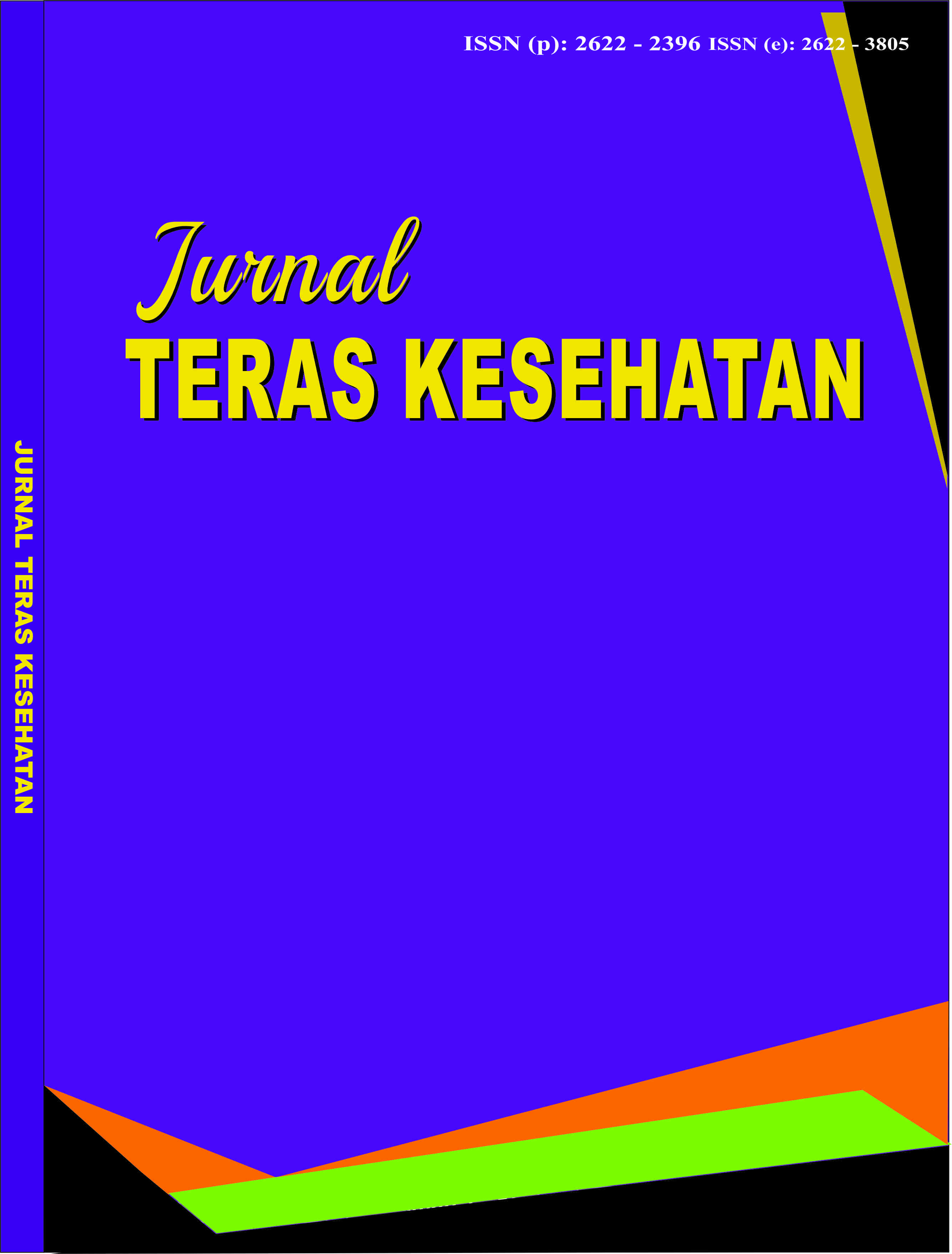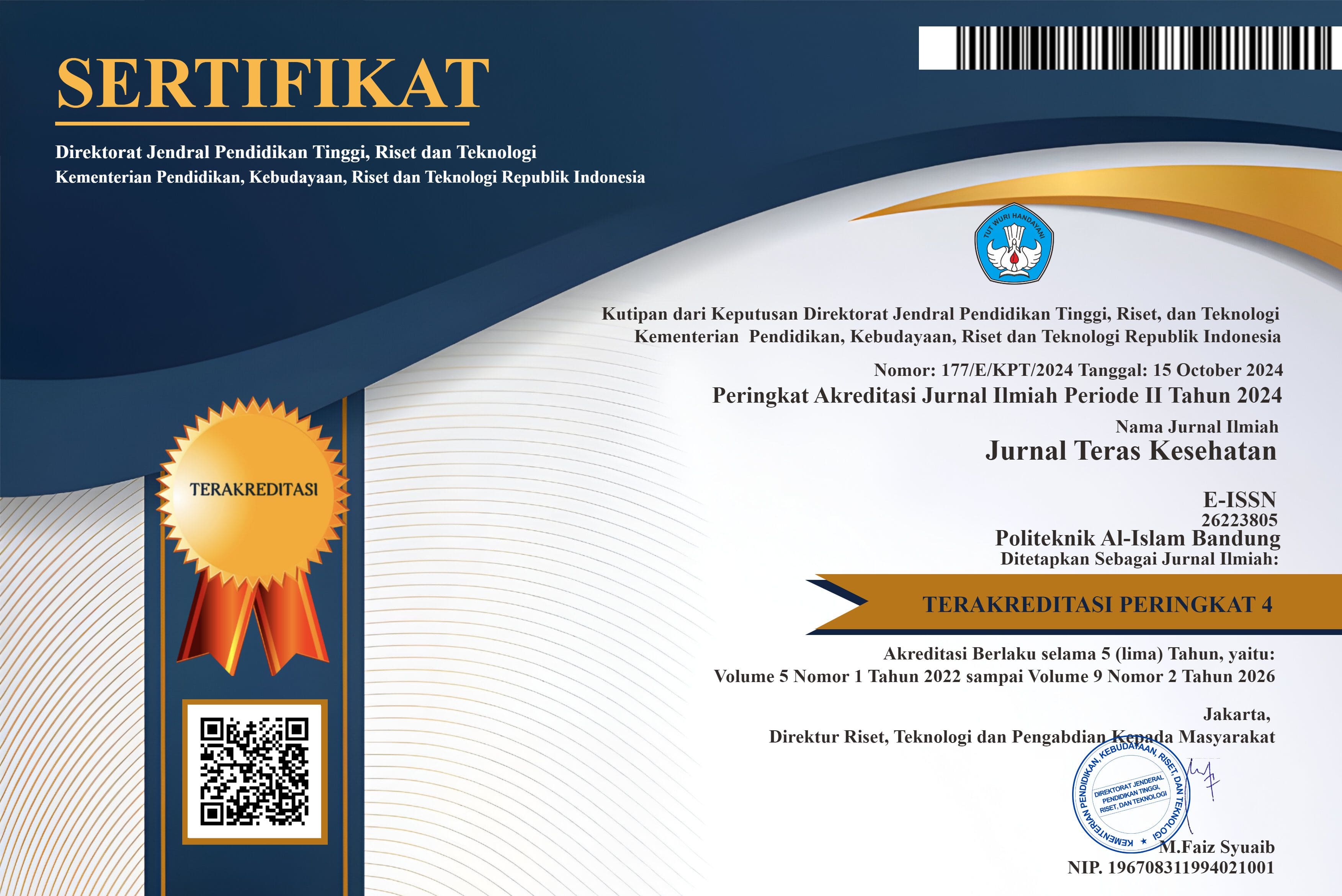FAKTOR-FAKTOR YANG BERHUBUNGAN DENGAN PEMBERIAN ASI EKSKLUSIF PADA IBU BEKERJA DI KECAMATAN GONDOKUSUMAN KOTA YOGYAKARTATA CITY
RELATED FACTORS WITH EXCLUSIVE BREASTFEEDING ON WORKING MOTHERS IN GONDOKUSUMAN SUB-DISTRICT YOGYAKARTA CITY
DOI:
https://doi.org/10.38215/jtkes.v8i2.244Keywords:
attitude, exclusive breastfeeding, working motherAbstract
Indonesia has targeted a National exclusive breastfeeding coverage is 80%. Indonesia's exclusive breastfeeding coverage in 2017 is 35.7% The exclusive breastfeeding coverage of Yogyakarta is only 66.13%. Exclusive breastfeeding coverage is still low for various reasons, one of them is a working mothers. Research objectives: Known factors that relate to the exclusive breastfeeding knowledge, attitudes, availability of breastfeeding facilities during work, husband support, and healthcare personnel support in the sub-district Gondokusuman. Method: This research uses cross cross-sectional design. The population in this research is all mothers who have a baby aged 6-12 months. The sampling technique used is purposive sampling. Sample count of 47 samples. Data analysis using the Chi-square test. Results: Data analysis results obtained that there is a significant relationship of knowledge (p value 0.038; CC 0.350), attitude (p value 0.007; CC 0.366), availability of a breastfeeding facility during work (p value 0.001; CC 0.425), husband support (p value 0.019; CC 0.325) and healthcare personnel support (p value 0.011; CC 0.349) with exclusive breastfeeding on working mothers. Conclusion: There is a significant relationship between knowledge, attitude, availability of the breastfeeding facility during work, husband support, and healthcare personnel support with exclusive breastfeeding in the working mother.
Downloads
References
Al Ketbi, M. I., Al Noman, S., Al Ali, A., Darwish, E., Al Fahim, M., & Rajah, J. (2018). Knowledge, attitudes, and practices of breastfeeding among women visiting primary healthcare clinics on the island of Abu Dhabi, United Arab Emirates. International Breastfeeding Journal, 13(1), 1–14. https://doi.org/10.1186/s13006-018-0165-x
Alzaheb, R. A. (2017). A Review of the Factors Associated With the Timely Initiation of Breastfeeding and Exclusive Breastfeeding in the Middle East. Clinical Medicine Insights: Pediatrics, 11, 117955651774891. Retrieved from http://journals.sagepub.com/doi/10.1177/1179556517748912
Badan Pusat Statistik. (2018). Statistik Daerah DIY. DIY: Badan Pusat Statistik DIY.
Boccolini, C. S., de Carvalho, M. L., & Couto de Oliveira, M. I. (2015). Factors associated with exclusive breastfeeding in the first six months of life in Brazil: A systematic review. Revista de Saude Publica, 49. https://doi.org/10.1590/S0034-8910.2015049005971
Dinas Kesehatan Provinsi DIY. (2017). Provinsi Di Yogyakarta Tahun 2017.
Dun-Dery, E. J., & Laar, A. K. (2016). Exclusive breastfeeding among city-dwelling professional working mothers in Ghana. International Breastfeeding Journal, 11(1), 1–9. https://doi.org/10.1186/s13006-016-0083-8
Ekawati, D., Salimo, H., & Murti, B. (2015). Biopsychosocial and Institutional Factors Associated with Exclusive Breastfeeding among Working Mothers in Klaten , Central Java, (36), 197–206.
Ireland, N., Hamlyn, B., Brooker, S., Oleinikova, K., & Wands, S. (2000). I N FA N T F E E D I N G 2000 A survey conducted on behalf of the Department of Health , the Scottish Executive , the National Assembly for Wales and the Department of Health , Social Services and Public Safety in. Assembly.
Kandeel, W. A., Rabah, T. M., Zeid, D. A., El-din, E. M. S., Metwally, A. M., & Shaalan, A. (2018). Determinants of Exclusive Breastfeeding in a Sample of Egyptian Infants, 6(10), 1818–1823.
KEMENKES RI. (2016). Profil Kesehatan Indonesia 2015. Jakarta: Kementerian Kesehatan RI.
Notoatmodjo, S. (2017). Soekidjo, Notoatmodjo. 2010. Promosi kesehatan teori dan aplikasi. Jakarta : PT Rineka Cipta. 41-46. Jakarta: Rienka Cipta.
Osibogun, O. O., Olufunlayo, T. F., & Oyibo, S. O. (2018a). Knowledge, attitude and support for exclusive breastfeeding among bankers in Mainland Local Government in Lagos State, Nigeria. International Breastfeeding Journal, 13(1), 1–7.
Osibogun, O. O., Olufunlayo, T. F., & Oyibo, S. O. (2018b). Knowledge, attitude and support for exclusive breastfeeding among bankers in Mainland Local Government in Lagos State, Nigeria. International Breastfeeding Journal, 13(1), 1–7. https://doi.org/10.1186/s13006-018-0182-9
Roesli, U. (2012). Panduan Inisiasi Menyusu Dini Plus ASI Eksklusif. Jakarta: Pustaka Bunda.
Sariati, Y., Prastyaningrum, V. Y., Kurniasari, P., & Mustarina. (2017). Faktor-Faktor Yang Mempengaruhi Keberhasilan Asi. Journal of Issues In Midwifery, Vol. 1(No. 1), 1–18.
Statistik, B. P. (2017). Statistik Indonesia. Jakarta: Badan Pusat Statistik.
Tan, K. L. (2011). Factors associated with exclusive breastfeeding among infants under six months of age in peninsular malaysia. International Breastfeeding Journal, 6(1), 2. https://doi.org/10.1186/1746-4358-6-2
Utami, R. (2015). Panduan Praktis Menyusui. Jakarta: Puspa Wara.
World Health Organization (WHO). (2011). Exclusive Breasfeeding. Retrieved September 13, 2018, from http://www.int/nutrition/topic

Downloads
Published
Issue
Section
License
Copyright (c) 2025 Jurnal Teras Kesehatan

This work is licensed under a Creative Commons Attribution-ShareAlike 4.0 International License.
Authors who publish articles in Jurnal Teras Kesehatan agree to the following terms:
- Authors retain copyright of the article and grant the journal right of first publication with the work simultaneously licensed under a CC-BY-SA or The Creative Commons Attribution–ShareAlike License.
- Authors are able to enter into separate, additional contractual arrangements for the non-exclusive distribution of the journal's published version of the work (e.g., post it to an institutional repository or publish it in a book), with an acknowledgment of its initial publication in this journal.
Authors are permitted and encouraged to post their work online (e.g., in institutional repositories or on their website) prior to and during the submission process, as it can lead to productive exchanges, as well as earlier and greater citation of published work (See The Effect of Open Access)








